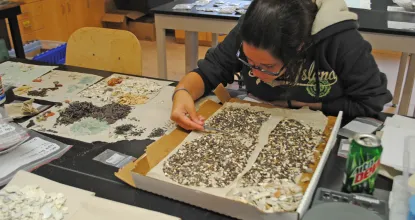Our programs provide students with an understanding of theory and methodology, and offer opportunities to apply knowledge learned in the classroom to experiences in the field through work placement and internship opportunities. Each of our programs also stresses the importance of interdisciplinary education, so students graduate with a well-rounded background that provides a solid foundation for growth in their professional lives. Additionally, small class sizes allow students to build relationships with faculty and classmates that foster their development as students and professionals.
Our department offers course work in two distinct areas:
Sociology
The sociology program emphasizes both theory and methodology, and the major offers an opportunity to investigate a variety of substantive areas such as environmental sociology, social class, race, gender and sexuality, family, religion, death, dying, and grief, and social justice and social change. Students in our program develop marketable skills in research and in applying an understanding of how social systems operate. Students who hold this degree are well prepared for graduate study. The major is valuable in a variety of fields, including community work, corrections, government services, health services, business, public relations, research, and social services. Furthermore, the conceptual and critical thinking skills students gain in our program are intended for world-readiness, which goes beyond the essential goal of near-term workforce readiness to empower students for life, work, and citizenship in an age of daunting challenges in need of world-embracing solutions.
Anthropology
We also offer an active and diverse program in anthropology, including a functioning forensic research outdoor station (FROST). The department currently has three faculty members in anthropology. We now offer an anthropology major, and within that, a number of concentration options to help guide students in their areas of interest and study. We also offer a minor and a variety of courses in all subfields of anthropology. The summer archaeology field school is offered every other summer and students usually get scholarships to help defray costs. Students have many opportunities to work closely with faculty on several on-going projects through volunteering or directed study courses. These experiential learning opportunities help students to prepare for graduate programs and employment in anthropology.
